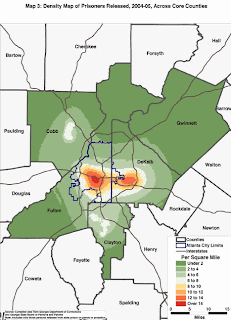One out of every 100 Americans is incarcerated. One in 13 adults in Georgia is either in jail or on probation and parole, and the state holds the fifth largest prison population in the nation.
Hundreds of prisoners are released and return to metro-Atlanta neighborhoods every month. For Emory's Office of University-Community Partnerships, which has worked with dozens of community groups, services organizations, policy makers and government leaders for nearly a decade, issues around incarceration are a big piece of the puzzle in developing strategies to build strong communities.
"In many ways, the success or recidivism of former inmates has a tremendous impact on the communities where they settle, but given the stigma attached, it hasn’t exactly been a cause championed by many. But, positive reentry is a  necessity, not an option, when it comes to public safety, preserving families and the development and stability of neighborhoods," said assistant professor of political science Michael Leo Owens, coauthor of the study "Prisoner Reentry in Atlanta: Understanding the Challenges of Transition from Prison to Community."
necessity, not an option, when it comes to public safety, preserving families and the development and stability of neighborhoods," said assistant professor of political science Michael Leo Owens, coauthor of the study "Prisoner Reentry in Atlanta: Understanding the Challenges of Transition from Prison to Community."
The report was recently completed by OUCP, and its authors hope their findings spark conversation and action among government leaders, service providers and community organizations to address the challenges of facilitating the positive integration of former prisoners back into communities. In addition to Owens, an OUCP senior faculty fellow, the study was compiled by Michael Rich, OUCP executive director and associate professor of political science, Sam Marie Engle, OUCP senior director, and Moshe Haspel, OUCP's director of research and Evaluation.
The immensely detailed and comprehensive reentry report analyzes data showing where people go in metro-Atlanta when they get out of prison, what support services, such as job training, mental health and substance abuse counseling, are there for them, and the availability of affordable housing and jobs. OUCP's study is part of the Urban Institute's national Reentry Mapping Network, which covers a dozen metropolitan areas around the country.
The study tracked nearly 5,000 people released from state prisons into probation and parole in 2004 and 2005 (as provided by the Georgia Department of Corrections and Georgia State Board of Pardons and Paroles) who took up residence in the five core metro-Atlanta counties: Fulton, DeKalb, Gwinnett, Cobb and Clayton. About a fifth settled in the city of Atlanta. While the greatest concentration was in and around Atlanta neighborhoods, prisoner reentry affects the entire metro-area. More than 80 percent of the former prisoners were non-violent offenders.
Focus groups with former prisoners, service providers and faith-based and government organizations filled in the picture of what issues former prisoners and communities face. Surveys also provided insight on public attitudes toward former prisoners.
Outside of access to services, securing jobs and affordable housing posed the biggest challenges to successful reentry for ex-offenders.
Gaining employment was hindered by multiple obstacles: In addition to low levels of education and work experience, and the reluctance of employers to hire someone who has served time in prison, they also lacked the personal networks to help them identify and secure jobs. Those findings echoed the experiences of government and community-based reentry service providers.
However, "housing was identified as the most central issue and need people faced immediately upon their return or move to Atlanta," said Owens. "For those released from prison without obtaining a guaranteed bed at a transitional house or shelter, and possessing only their $25 in 'gate money,' finding a place to stay that was secure, decent and accessible was often impossible."
The study also found differences in the types of programs offered by secular agencies and faith-based groups but overall they were often not in the geographic area where they are needed most.
"One thing we heard again and again from service providers was: 'I wish I knew what everyone else was doing,'" says Engle. "We hope that an outcome of this study will be a stronger network and coordination to provide the services that are needed."
-----
www.fayettefrontpage.com
Fayette Front Page
www.georgiafrontpage.com
Georgia Front Page
Friday, March 27, 2009
Study Focuses on Barriers to Successful Prisoner Re-Entry Into Atlanta Communities
Subscribe to:
Post Comments (Atom)

No comments:
Post a Comment